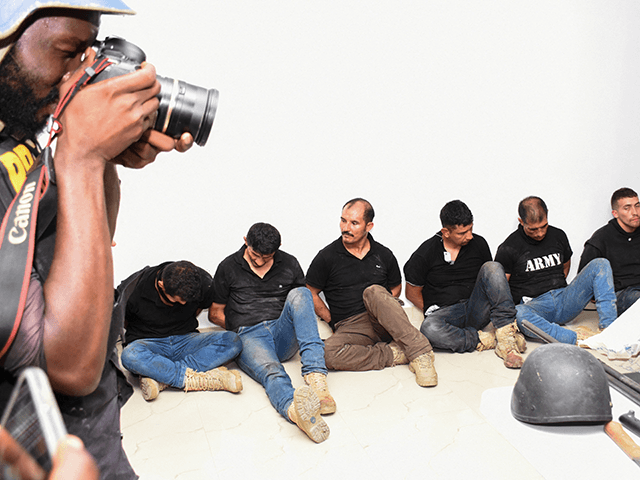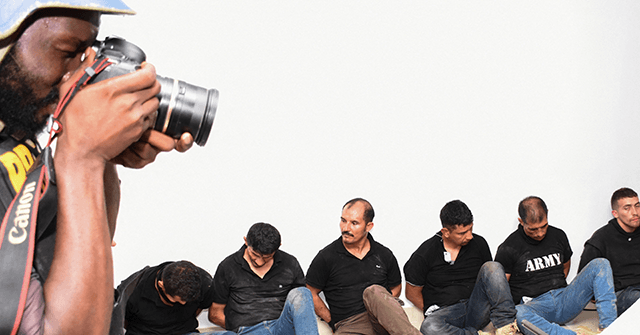By JOHN HAYWARD

Most members of the “commando squad” sent to assassinate President Jovenel Moise on Wednesday have been killed or taken into custody, police in Haiti said on Friday.
The suspects reportedly include two Haitian-Americans and 26 Colombian military veterans. A manhunt for the masterminds of the plot continues with international assistance.
Haitian Minister of Elections Mathias Pierre on Thursday identified two of the detainees as Haitian-Americans: 35-year-old James Solages and 55-year-old Joseph Vincent. He offered no further information.
Fox News located a website for a South Florida charity evidently established by Solages in 2019 in which he claimed to be a “certified diplomatic agent” whose resume included working as a bodyguard for the Canadian embassy in Port-au-Prince, Haiti.
The web page was actively soliciting donations toward “ending childhood hunger in Haiti” until it was deleted Thursday. Solages’s alleged nonprofit organization reported $11,000 in donations to the U.S. government in 2019, the South Florida Sun Sentinel said.
The Canadian Foreign Ministry, also known as Global Affairs Canada, confirmed Friday that James Solages was “briefly employed as a reserve bodyguard by a security company hired by Global Affairs Canada in 2010.”
Solages also has a page on the career-networking platform LinkedIn that claims he holds a bachelor’s degree in information technology and has been trained as a military policeman and a mechanical, electrical, and plumbing contractor. His purported LinkedIn profile said he received two years of close-quarters battle training at a Florida security school.
“My son killed my brother! That’s the way I feel like my son killed my brother because I love my president and I love James Solages,” exclaimed Schubert Dorisme, a resident of Tamarac, Florida interviewed by local news station WPLG on Thursday.
Dorisme identified Solages as his wife’s nephew. He told WPLG that Solage’s Haitian charity was legitimate and said Solages made frequent trips to Haiti for charity work, particularly his hometown – the southern port town of Jacmel, where Solages hoped to someday run for mayor.
“For me, I think they used him. They used him because This guy is a boy. He’s a boy. He always called me Big Uncle, you know, I love him,” Dorisme said of Solages.
In another interview, Dorisme said Solages “used to tell me that ‘this Jovenel guy is crazy,’” a reference to the murdered Haitian president. He still insisted Solages would never become involved in an assassination plot.
Solages had a Twitter account that posted photos of him working with children in Haiti, but it became inactive about a year ago, the Sun Sentinel noted. In one of his final tweets, Solages complained about living in a “crazy time” with “no loyalty or real genuine love.”
Solages held licenses as a security guard and firearms owner, but both have expired, WPLG noted. Solages had a Facebook page that said he was a resident of Ft. Lauderdale and attended Florida Career College, but it was deleted Thursday.
Social media posts from Haitians claiming to know Solages said he worked as a security guard for Reginald Boulos and Dimitri Vorbe, two of slain President Jovenal Moise’s political opponents, the Haitian Times reported. One resident of Jacmel said Solages was particularly close to Vorbe, serving as his “right-hand man.”
Another Haitian source claimed Solages worked as a security guard for a Nissan auto dealership owned by Vorbe and claimed the hit squad that killed Moise was driving five Nissan patrol cars sold to the Haitian police by Vorbe’s company.
Photos and videos released by the police General Directorate in Port-au-Prince and acting Prime Minister Claude Joseph showed Solages and the other Haitian-American among 17 handcuffed prisoners held in connection with the Moise assassination. Vincent is a naturalized U.S. citizen from Haiti who resides in the Miami area, the Miami Herald said.
#NEW: Facebook Live from interim Prime Minister @claudejoseph03 shows more than a dozen suspects in custody following the assassination of Haitian president #JovenelMoise.
Haitian-American, James Solages of South Florida, is seen in t-shirt and khakis in the video. @nbc6 pic.twitter.com/qZBqOgdVWI
— Ryan Nelson (@RyanNelsonTV) July 9, 2021
Much less information has been revealed about Vincent than Solages. He appears to have no major online footprint and not much of a paper trail. It is not yet clear if Vincent was linked to Solages while they were living in Florida.
As for the rest of the assassination team, Haitian officials have offered conflicting statements about how many are in custody and how many died in gunfights with police, but the group is reportedly comprised of 26 Colombians with military backgrounds.
Reuters on Friday reported on a police conference by police officials:
Police Chief Leon Charles paraded 17 men before journalists at a news conference late on Thursday, showing a number of Colombian passports, plus assault rifles, machetes, walkie-talkies and materials including bolt cutters and hammers.
“Foreigners came to our country to kill the president,” Charles said, noting there were 26 Colombians and two Haitian Americans. He revealed that 15 of the Colombians were captured, as were the Haitian Americans. Three of the assailants were killed and eight were still on the run, Charles said.
Jorge Luis Vargas, director of Colombia’s national police, said he had received information requests from Haiti on six suspects, two of whom had apparently been killed in an exchange with Haitian police. The other four were under arrest.
According to Haitian judge Clement Noel, the arsenal and loot collected by the police included five firearms, a supply of 5.56 ammunition, bulletproof vests, the server from the video security system at Moise’s residence, a checkbook stolen from the president and first lady, thousands of dollars in American cash, cell phones, and a July 6 rental agreement for vehicles from the Avis company.
Noel told reporters that Solages and Vincent worked as “translators” for the assassination team and were hired over the Internet. The judge said Vincent has been living in Haiti for the past six months, while the Colombian “mercenaries” arrived about three months ago. Haitian media reports indicate an atmosphere of paranoia is developing as various Haitian political figures are accused of sheltering the mercenaries until they launched their attack.
Curiously, Noel said the commando squad’s mission was to “arrest” President Moise under the “mandate of an investigating judge, not to kill him.” In the end, they murdered Moise by shooting him at least a dozen times, wounding his wife in the process.
In another strange wrinkle to the investigation, the Taiwanese embassy in Haiti reported 11 of the suspects broke into its grounds while fleeing from police. Embassy staffers called in the Haitian police, who arrested the heavily-armed suspects. The embassy is located near the presidential residence where Moise was assassinated Wednesday.
“The government of Taiwan reiterates its support for interim Prime Minister Claude Joseph in leading Haiti to overcome this crisis and restore democratic order,” said the Taiwanese Foreign Ministry.
The Haitian public also participated in the manhunt and reportedly subdued several of the suspects, then firebombed automobiles they believed were used by the assassins.
“They killed the president! Give them to us. We’re going to burn them!” the crowd could be heard chanting on video uploaded to social media as police took the suspects into custody.
Police chief Leon Chares said at his press conference that eight suspects are still on the run, “and we are asking for the support of the population so the police can recover all the killers and hand them over to justice.”





